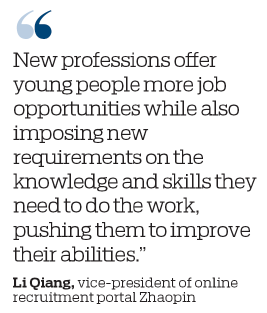China to recognize 19 emerging professions that contribute to growth

China has announced plans to recognize 19 new professions related to the digital economy, smart manufacturing and modern services that contribute to the nation's overall economic development.
The new professions include biological engineer, livestreaming host and generative AI system operator, according to the Ministry of Human Resources and Social Security.
Young workers are particularly attracted to such jobs.
"I don't like wearing the same clothes as other people or doing traditional jobs as the previous generations did. Being a livestreaming anchor interests me, as I love sharing everything beautiful with my peers and bringing joy to them," said Yan Zewen, 26, who has been doing the job for three years in Hangzhou, Zhejiang province.
Yan said she felt she was an "underdog" when she took the position in 2021, as it wasn't an attractive job to most university graduates.
"I had some misunderstandings with my friends and parents, but I pulled through," she said. "The job earns me a considerable salary, and I'm happy to hear the news that it will be getting official recognition from the government."
Yan is among the new generation of workers who have shown an increasing preference for new or niche professions, especially those closely related to the digital economy. A recent survey by the online recruitment portal Zhaopin shows that in the first quarter of this year, over a third of people polled have demonstrated an interest in working as industrial robot system operators, while around 27 percent said they would like to become home organizers.
"Many new professions have emerged with the development of new technologies as a result of the nation's industry upgrades," said Li Qiang, vice-president of Zhaopin. "New professions offer young people more job opportunities while also imposing new requirements on the knowledge and skills they need to do the work, pushing them to improve their abilities."
Li said that the emergence of new professions reflects the market's critical need for new technologies and industries, and the government can set standards for the professions by giving them official recognition.
"Recognizing these professions can also eliminate the public's discrimination of workers serving in new industries and protect their rights. Approving these new professions shows the nation's increasing attention to artificial intelligence and intelligent connected vehicles, which can attract more talent to these industries," he added.
The human resources ministry recognized 74 new professions from 2019 to 2022, covering the sectors of agriculture, healthcare, information technology, education and elderly nursing.

- Grand ceremony marks Confucius' birthday in Zhejiang
- China to see cooler weather but favorable travel conditions over National Day holiday
- Music video showcases Wuxi's heritage, progress
- Expert: Raising retirement age unlikely to affect employment opportunities
- Pingtan center a key stop for Taiwan compatriots seeking mainland qualifications
- Over 5,000 artists to take part in Shanghai festival





































